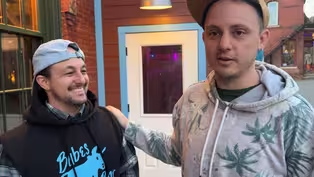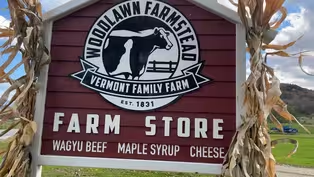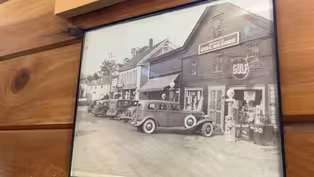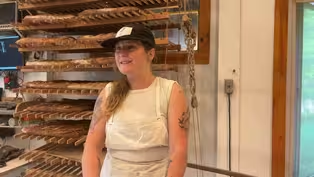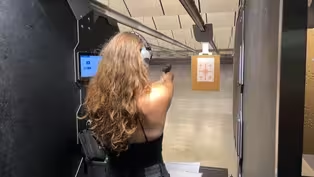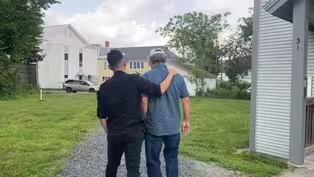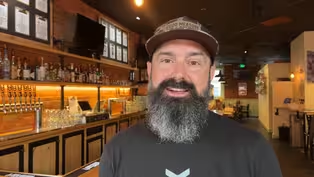Made Here
Vermont Businesses: Nelson Farms in Irasburg
Special | 11m 27sVideo has Closed Captions
The Nelson family, multigenerational dairy farmers operating two dairy farms.
Rocket visits with the Nelson family, multigenerational dairy farmers operating two dairy farms – one organic, one conventional – as Nelson Farms in Irasburg. In discussion with Dylan and Meg, the husband and wife team managing these farms, Rocket explores the differences and surprising depth of similarities between these operations. The Nelsons discuss the ways dairy farmers are using technology.
Problems playing video? | Closed Captioning Feedback
Problems playing video? | Closed Captioning Feedback
Made Here is a local public television program presented by Vermont Public
Sponsored in part by the John M. Bissell Foundation, Inc. and the Vermont Arts Council| Learn about the Made Here Fund
Made Here
Vermont Businesses: Nelson Farms in Irasburg
Special | 11m 27sVideo has Closed Captions
Rocket visits with the Nelson family, multigenerational dairy farmers operating two dairy farms – one organic, one conventional – as Nelson Farms in Irasburg. In discussion with Dylan and Meg, the husband and wife team managing these farms, Rocket explores the differences and surprising depth of similarities between these operations. The Nelsons discuss the ways dairy farmers are using technology.
Problems playing video? | Closed Captioning Feedback
How to Watch Made Here
Made Here is available to stream on pbs.org and the free PBS App, available on iPhone, Apple TV, Android TV, Android smartphones, Amazon Fire TV, Amazon Fire Tablet, Roku, Samsung Smart TV, and Vizio.
Providing Support for PBS.org
Learn Moreabout PBS online sponsorshipMore from This Collection
A series of eight video stories, called Small Vermont Businesses in Small Vermont Towns. Filmmaker Rocket's video series was supported in part by Vermont Public's Made Here Fund, launched in 2022 to broaden and diversify Vermont storytelling. Rocket's project was one of 10 projects selected by a jury in and funded in 2023.
Vermont Businesses: Babes Bar in Bethel
Video has Closed Captions
Babes is at once a queer friendly space, a watering hole for locals, (11m 45s)
Vermont Businesses: Woodlawn Farmstead in Pawlet
Video has Closed Captions
Explore how vertical integration has been essential for this Pawlet, Vermont dairy farm’s survival. (7m 20s)
Vermont Businesses: Willey's Store in Greensboro
Video has Closed Captions
Visit with Rob Hurst, the fifth generation proprietor of Willey’s Store in Greensboro. (13m 18s)
Vermont Businesses: Elmore Mountain Bread
Video has Closed Captions
Visit to a home bakery renowned for its wood-fired, stone-milled breads. (8m 26s)
Vermont Businesses: Parro's Gun Shop
Video has Closed Captions
Visit with the founder and owner of Parro’s Gun Shop & Police Supplies, a firearm emporium. (8m 3s)
Vermont Businesses: Jenna’s Promise is turning tragedy into hope in Johnson
Video has Closed Captions
Visiting a non-profit founded in memory of Jenna Tatro, a victim of the ongoing opioid epidemic. (9m 21s)
Vermont Businesses: Good Measure has community, food and beer brewing in Northfield
Video has Closed Captions
Tour a welcoming pub with a seasonal menu and small-batch brews located in downtown Northfield, VT. (7m 41s)
Providing Support for PBS.org
Learn Moreabout PBS online sponsorship-Cheese.
Cheese.
-Okay, great.
-All right.
-Do you want to tell me -about the farm?
-What's the name of your farm?
-What's your last name?
-Nelson.
Nelson.
-And so your farms are Nelson -Farms.
-Yeah.
-Hello, everyone.
-Today I am at Nelson Farms, -which is in Irisburg, -way up in the Northeast -Kingdom, -just south of Newport.
-I've been coming out here -since summertime -to tell the story -of the Nelson family.
-Now, the Nelson family, -They live out here -and they operate -two businesses.
-Currently -there are dairy farms.
-Hi, I'm Dylan Nelson.
-I'm one of the owners here -at Nelson Farms Inc. -We manage over 2600 cows, -both conventional and -!organic, and we crop about 5000 -total acres between -the two dairies.
Cool.
-This family farm -was started by my grandfather -a long time ago.
-We're -aiming to keep that going.
-And hopefully the future -generations to come -are harvesting milk as well.
-Hi, I'm Meg, I'm -married to Dylan.
-We've been married -for eight years, -and I've always been farming.
-And last year, -we had the opportunity -to get into the organic side -of dairying.
-So I ran our organic division -just across the street from, -Dylan's facility.
-Why take the steps to go so -!far to build this new facility?
-So, we're coming out -of a long history of my -my grandfather started, -with 13 cows a long time ago.
-and over the years, -some of the, the technology -progressed so much, -and we were milking on -many facilities, -to accomplish the same thing -that one could.
-!So our goal was to centralize, -gain on, -on a lot of efficiencies, -whether it be labor, -technology, machinery, -and try to push -through into the future.
-Why is that?
-Well, it's because -we're being pushed that way.
-I'd say, -we have to compete with -and sadly with our neighbors.
-And we also have to compete -with, with the Midwest -and the West and, to sell -a product that we don't -have control over the price.
-And, -the expression -is we buy -every everything at retail -and sell everything -at wholesale.
-So we have to get bigger -just to stay alive.
-Simple economics.
Yeah.
-It's astonishing.
-Honestly.
-It it leaves me a little bit -lost for words in terms of -how to explain -the amount of technology -that's happening here?
-Dairy historically has been -an incredibly labor -intensive business.
-You need someone to milk -all the cows.
-If you have a farm -in the Northeast Kingdom, -finding -labor can be very difficult.
-So going high tech -and using a milking parlor -like this is an extraordinary -leap in productivity.
-Every single cow wears -an all flex tag.
-You see the blue -around their neck.
-and it's a simple collar.
-It's an accelerometer.
-The same thing -that's in your smartphone.
-And it detects movement.
-And there's, -there are certain -algorithms that, as a cow -moves her head, one way -or how much -she moves through the barn.
-So that really just maximizes -your ability -to take care of the cows -health -!at the individual level.
Yeah.
-The beauty of this system is -that we're able to work -with the cows, -catch them -quickly off of milking, -!work with them and return them -back to their homes.
-A lot of this technology -!allows us to manage individual -cows on a large scale, -but also leave them alone -and just let them be cows.
-In the conversation -of dairy and dairy farming -we often get this narrative -that gets pitched as is -if organic is somehow -better than conventional.
-Now the Nelson -family operates -two farms, one conventional -right here -and the other organic, -which is just down the road.
-It's the same family, -the same philosophy.
-They care about their cows.
-They care about the land.
-They care about the product.
-!They care about the consumers.
-So this is our organic dairy, -where we follow a different -set of guidelines and rules.
-and we're certified -for the organic market.
-So all of the feed -and, and milk this produce -!here is all certified organic.
-So this provides a little bit -of a, a different product -to more of a niche market, -which is different than what -we do on the big farm.
-And the perception around -organic and conventional -are that they're very -different markets.
-And obviously -the certifications -and the requirements -are different.
-But for one, the same family -runs both, you know, -what's that like -and what's the philosophy.
-And, you know, the philosophy -for us wasn't really -about the market so much as -that it was more -about the consumer.
-We see that -!we have all these choices when -you go into the supermarket.
-And if we can bring you -both, and, -and learn about a new way -of doing things for -you, was our, -thoughts going into this?
-I got to say, really, -it's very different, -but there's a lot of overlap.
-So on both facilities, -we use technology -that monitors -the cows on their rumination -and their activity.
-On both, were getting -daily data on each cow -so were managing cows -on an individual basis.
-And we're leaving them alone -if they don't need anything.
-So it's huge because -we can give therapies, -we can get fluids, -we can do other things -that have nothing to do with -spending money on drugs.
-Yeah.
-If you're thinking -about maximizing -output with minimal inputs, -the conventional dairy -is the way to go.
-But if you're -more concerned about methods, -probably the organic, -but they're both safe.
-They both provide a different -option for the consumer.
-We take pride in care in -how we handle all of our milk -and my family -we drink the raw, -organic milk from this dairy -here, and I would do the same -from the big farm.
-It's just simply, -this farm's a little closer.
-One of the really cool -!things about the Nelson family -is just how much the Nelsons -let their boys be kids -like, barefoot out on the -farm, in the calf pen, -running around, -getting dirty.
-Farmers being farmers, kids -being kids -raised out in the country.
-What else could you want?
-Can you talk about, -if you're willing, being -a mom, having three boys.
-And what that's like -letting them run around?
-Yeah, sure.
-so I grew up on a family -farm, having the boys, -the three boys.
-And we have another baby -on the way.
-I just love seeing them run -around and play in the dirt -and get dirty and not worry -about immunities and such.
-They drink raw milk, -and they just - -its awesome.
-They'll they'll come in and -they'll help me feed calves.
-They know how to do stuff -already.
-They're five, four and two.
-So it's just really cool -to see.
-Yeah, yeah.
-And it's certainly busy.
-I do a lot of my day happens -in the very early morning -and then in the middle -of the day during nap, -but it's, -it's definitely a fun time.
-Cool.
Yeah.
-My goal, -Raising children that have -an appreciation for the land.
-And a really core knowledge -of where food comes from.
-it's really important to me.
-And then as far as this long -term legacy, I just.
-I want to leave everything -better than how I found it.
-I hope our legacy -and our our hard work, -spans to the next generations -to come and builds -a, a profitable business -that our kids can be proud -to run and own and -and continue to deliver -a high quality product -which is nature's -most nearly perfect food.
-I hope that -!the story of the Nelson family -and how they operate, -both a conventional dairy -and an organic dairy, -helps to illustrate that -!these are not wildly divergent -philosophies.
-Rather, these two methods -are simply different ways -by which dairy farmers -are working to adapt -and survive -in this crazy industry -that dairy has become -farming has always been -an immensely difficult -labor of love, -and my hope -!is that by telling this story, -the general public can have -a deeper understanding -and appreciation for the work -the dairy farmers -put in to keeping -not only the herds healthy -!and their businesses thriving, -but also being custodians -of the environment -and also trying every day -to continue -delivering high quality, -nutritious product for us.
-One of the things I want to -make clear to anyone watching -is that, -you know, this whole time -that I have been coming up -to visit with, the Nelsons, -they have never once -asked me to cut the camera -on anything -they have not said.
-Oh, please -don't film over here.
-Please don't show this.
-And they are complete -transparent about the way -that they operate, -both the conventional -and the organic.
-And there is such a obvious -sense of pride in their work -and a immense sense -of accountability -to their process -!and the way that they operate.
-And it gives me -a lot of confidence in that.
Support for PBS provided by:
Made Here is a local public television program presented by Vermont Public
Sponsored in part by the John M. Bissell Foundation, Inc. and the Vermont Arts Council| Learn about the Made Here Fund
